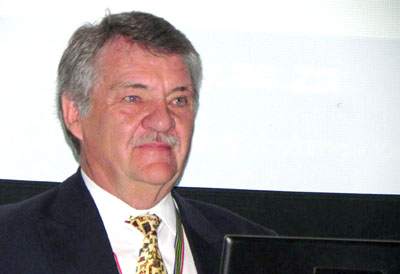Latest News Archive
Please select Category, Year, and then Month to display items
08 April 2021
|
Story Thabo Kessah
|
Photo UFS Photo Archive
 Dr KPD Maphalla with former UFS Chancellor, Dr Franklin Sonn, during the graduations in April 2007.
Dr KPD Maphalla with former UFS Chancellor, Dr Franklin Sonn, during the graduations in April 2007.
The University of the Free State is sad to learn of the passing of alumnus and award-winning Sesotho literary giant, Dr KPD Maphalla.
The literary works of Dr Khotso Pieter David Maphalla, like many other African writers and artists, were influenced and characterised by his own era of powerful forms of oppression and exclusion from dominant literary discourses. In his own right and through his writings of poetry, novels, short stories, and kodiamalla (dirge), he articulated a deliberate political and social protest and pushed for a place for African languages in literature at the height of apartheid.
“He entered the professional scene with his ground-breaking novel, Kabelwamanong, in 1982 at the age of 27. His career actually started in 1971 while he was still at school. Since his first novel, he has produced at least two books annually, covering the genres of poetry, novels, dramas, and short stories. As a dramatist, Dr Maphalla has written a number of excellent and educative radio dramas for the then Radio Sesotho (now Lesedi FM),” said his long-time friend and Head: African Languages at the University of the Free State, Dr Nyefolo Malete.
“It was for this writing prowess that he received recognition from the UFS when he was awarded an Honorary Doctorate in Literature by the Department of African Languages during a momentous ceremony on the Qwaqwa Campus in 2007,” added Dr Malete.
Dr Malete also revealed that, despite losing the use of his right hand after suffering a stroke following a car accident in the late 1990s, Dr Maphalla continued writing using his left hand. “He was adamant that, what he referred to as his ‘supposed disability’, would not deter his passion for writing.”
Dr Maphalla’s work has also produced numerous scholarly studies by the likes of Profs Moleleki Moleleki (protest poetry), Thapelo Selepe (lament and protest poetry), and Dr Seema Seema (process of cross-cultural communication). He was a committed Qwaqwa community member, who was also instrumental in the founding of Qwaqwa Community Radio (2000) and Metjodi Writers (2006), among others. He has written more than 70 books, many of which have been prescribed texts in schools.
Some of the awards he has won include:
South African Centre for Digital Language Resource (SADiLar) Sesotho Lexicographic Unit (Sesiu sa Sesotho) Lifetime Award for outstanding literary works and for promoting Sesotho literature (2019).
The Literature Festival and the University of the Free State Award for enormous contribution to Sesotho literature by a South African writer (2019).
Lifetime Achiever Award in Literature awarded by the Department of Arts and Culture (2005).
M-Net Book Prize for Sesotho poetry (2005). The first and thus far the only Sesotho author to have received this honour.
M-Net Book Prize for best novel (1996).
De Jager-HAUM Literary Award for his volume of short stories, Mohlomong Hosane (1993).
Thomas Mofolo Trophy for Best Novel, Best Poetry, and the Overall Award (1992).
Thomas Mofolo Trophy for Best Poetry (1991).
Dr JJ Moiloa Floating Trophy for Best Sesotho Poetry Book of the Year, Kgapa tsa ka (1985).
Prof. Johan Grobbelaar part of history
2010-09-23
 |
|
Prof. Johan Grobbelaar from the Department of Plant Sciences at the recent 31st Congress of the International Limnological Society (SIL), which was held in Cape Town.
Photo: Supplied
|
The 31st Congress of the International Limnological Society (SIL) was recently held at the Cape Town International Convention Centre (CTICC).
Prof. Johan Grobbelaar from the Department of Plant Sciences at the University of the Free State (UFS), who is also the chairperson of the local organising committee (LOC), worked hard for six years to secure the bid to host the congress in South Africa. The LOC consisted of Prof. Grobbelaar, Prof. Brian Allanson, Prof. Jenny Day, Dr Carin van Ginkel and Dr Mike Silberbauer.
SIL was founded in 1922 to further the study and understanding of all aspects of limnology, the science of inland aquatic ecosystems and their management.
Congresses are held every three years and this was the first time that SIL met on the African continent.
Almost 400 delegates from 42 countries attended this congress where the state of the science of limnology was presented with two keynote speakers, six plenary lectures, 230 oral and 76 poster presentations, mostly running in five parallel sessions. Exhibitions displayed some of South Africa’s role players as well as the latest equipment from abroad. Delegates could also join pre- and post-congress excursions and the new SIL journal, Inland Waters, was launched at the congress.
Many of the presentations dealt with water as a limited resource, pollution problems and the impact of climate change. The congress resolved that SIL would play a more prominent role in creating awareness of problems impacting on inland waters and also afforded solutions. The 32nd SIL congress will be held in Budapest, Hungary in 2013.